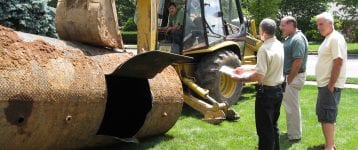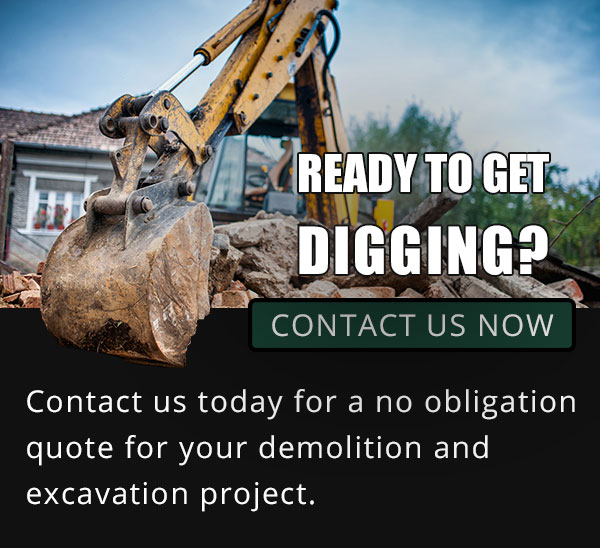It was common to heat the home using an underground oil tank in the backyard four decades ago. While this method has been widely abandoned, underground oil tanks remain on residential properties. They are a liability in that they may cause an oil leak on property, which leads to health problems and toxicity to the soil.
You can imagine why the method was short-lived. A repair to an underground oil tank was costly. If there was one oil leak on property, the surrounding soil was soaked, seeping oil into the pipes and causing health issues. Soil remediation is the process of cleansing the soil from the oil leak on property and is costly.
While there are several options for soil remediation, many of the options include removing the soil to treat it and return it back to its home. Unfortunately, oil spreads quickly, and this process can take weeks of hard work and money to remediate the soil from the oil leak. Detecting and underground oil tank and removing it immediately is the best way to get in front of this problem.
Detecting an Oil Tank Leak
The first step to detecting an oil leak is finding out if you have an underground oil tank on your land. Some clues include:
- An oil valve coming up out of the ground
- Copper lines going into your basement
- An oil breather pipe on the outside of your home
- An oil tank scan done by a contractor
An underground oil tank also has to be listed on the official survey of your land. Ask for a copy from your real estate agent or dig it up in your house files. If you discover you have an underground oil tank, look for signs of an oil spill.
An oil leak on property could manifest itself with a failure to grow grass or plants, a distinct oil smell when you dig around the oil tank, stained spots on your property, and an oil sheen in your water. Take immediate action once you suspect an oil leak on property. The longer it goes on, the more it will cost you to fix.
Financial Risks of a Damaged Oil Tank
When you find an oil leak coming from old, underground oil tanks, you may not know how long the oil leak has gone on. If the tanks were used for heating oil 40 years ago, the leak could be extensive.
When you buy a home with an underground oil tank, you will likely pay a higher premium to your insurance company until the oil tank is removed. There is a significant financial risk in keeping an underground oil tank on your property.
- Oil remediation costs going into the thousands of dollars that are not covered by insurance
- Health risks to you and your neighbors
- Lawsuits from neighbors
- Oil spreading to groundwater, deeming it unusable for irrigation
An oil leak on property could be detrimental financially. You want to do everything it takes to avoid these consequences. If you see signs that an underground oil tank once heated your house, do not assume it has been decommissioned. Instead, find the proper paperwork proving that it was, or hire a team to check out your property for an underground oil tank immediately.
Health Risks of a Damaged Oil Tank
Along with the devastating damage to the soil and environment from an oil leak on property, there are health implications as well. Of course, your household’s health is a priority, but these health effects can spread to the neighbors and the community if you don’t act on your oil spill as soon as possible.
Here are some health consequences of an oil leak on property:
- Harmful fumes inside homes: If you can smell oil, you’re ingesting toxic fumes. Do not ignore the smell of oil inside your house.
- Contaminated drinking water: Oil can seep into the drinking water and lead to the ingestion of the harmful substance. No one should be drinking water contaminated with oil.
- Dying plants: Vegetation cannot grow from soil that has an oil leak on property. The oil leak will cause the plants to die and bring down property values. All of the soil affected by the leak will need to be remediated before plants can grow again.
- Spread through drains: The oil can leak through drains and affect the sewage system.
- Spread to neighbor’s soil: Oil seeps through the soil at a fast rate, extending all the way over to the neighbor’s soil and killing their vegetation. Catch an oil spill early to avoid a lawsuit from neighbors who have contaminated soil because of your oil leak on property.
- Pollutes rivers and groundwater: And eventually, oil can travel into streams and rivers. It can fall deep into the groundwater and contaminate the water used for irrigation. The whole community can be affected by your oil leak on property if you fail to take action to fix the problem.
Do what it takes to research your property and remove an underground oil tank. It is a liability sitting on your property, ready to cost you a lot of money. It’s best to remove the oil tank before further complications occur. Call trusted contractors today for oil tank removal services.
Oil Tank Removal Contractor in NJ
At Mikula Contracting, you can count on our team to take care of your oil tank. If you suspect an oil leak on property, be sure to call us today to get started on soil remediation and oil cleanup. Do not delay taking care of your oil tank, as you can prevent a catastrophic oil spill on your property.
Let us come by and take a look at how we can assist you. If you want to look into oil tank removal or to fill your oil tank with dirt, we can present the pros and cons of both options. When you choose Mikula, you are choosing a family-owned company that has been in the industry for over 70 years. Our team is invested in New Jersey and its residents. Call today to get started.



